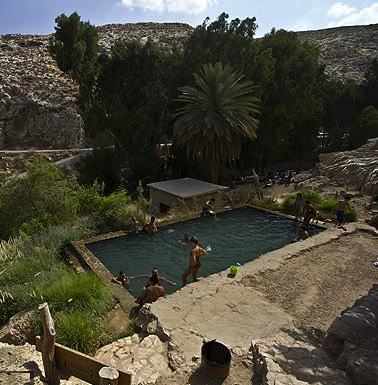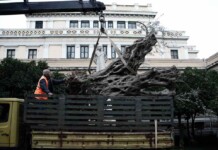 At first glance, Ein Prat, one of the many natural and historic sites hidden in the northern Judean Desert, looks like any other picnic site around the world.
At first glance, Ein Prat, one of the many natural and historic sites hidden in the northern Judean Desert, looks like any other picnic site around the world.
Large wooden tables and long benches are located strategically under shady trees on either side of a bubbling brook. Clusters of friends and family relax and enjoy each other’s company in the natural surroundings.
What sets Ein Prat – or Wadi Kelt, as it is known in Arabic – apart from other parks is that it is one of the few Israeli-run sites that Israelis and Palestinians can access equally, which has made it an oasis for peace.
The park is a few minutes’ drive from the Jewish neighborhoods in Jerusalem’s northern suburbs and it is almost equidistant from the Palestinian city of Ramallah. Those that descend on the park each weekend seem determined not to allow decades of occupation, violence or mistrust to stop them from enjoying its natural delights.
Surprisingly for the region, and unlike other places where Israelis and Palestinians come into close contact, there are no violent confrontations, angry words or accusations at Ein Prat/Wadi Kelt.
True, there is little interaction between the two groups, and there seems to be an unwritten agreement between the Israelis, who speak only Hebrew, and the Palestinians, whose mother tongue is Arabic, to treat each other like ghosts. And while this lack of interaction should not be mistaken for the simple politeness of strangers giving each other some space, it is a step forward.
The fact that Israeli and Palestinian children splash side-by-side in the natural pools and grown-ups seek relief together from the heat by wading through the cool waters suggests a glimmer of hope and the possibility of breaking down the growing barriers between the two peoples.
One of the main attractions of the park is a large natural pool half way up the mountain ravine. It is here – when the people have left the comfort of their separated picnic tables – that Israelis and Palestinians sit face-to-face around the perimeter of the cool, refreshing water.
Among the splashes of water and squeals of delight, members of the two groups eye one another, trying to determine if their so-called enemies are actually human beings or not.
Are we really all that different? In the natural light of this park, it seems not.
Through the stolen glances, there are some coy smiles and kind gestures. There mostly seems to be an acceptance that all are not only looking for some relief from the scorching midday sun, but also from the madness of an on-going conflict that affects our daily lives.
For just a moment, this park seems to be an ideal place for a peace summit. The thought of our respective leaders dipping in the cold water after negotiating each complicated point in this conflict suddenly seems entirely plausible. Perhaps the shock of the freezing water against burning skin and the realization that the land we are fighting over has been here much longer than any of the humans now inhabiting it might actually be enough to convince them that fighting and violence, oppression and occupation, are not the way to preserve this land for future generations.
While the idea of politicians ditching their suits and ties for swimming gear seems less plausible than their coming together at a negotiating table, the reality is that here in Ein Prat/Wadi Kelt ordinary Israelis and Palestinians do have a rare chance to meet. And although years of conflict have made us wary of one another, maybe it is in this desert oasis that those who appreciate the beauty of nature can find a way to make peace.
Photo: AllAboutJerusalem.com
Ruth Eglash is Deputy Managing Editor at The Jerusalem Post in Israel. She was invited to be one of the IARJ’s founding members by the International Center for Journalists and was elected to the association’s steering committee. This article was written for the Common Ground News Service. (Reprinted with permission.)



















